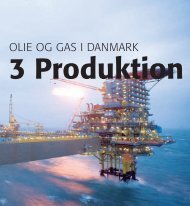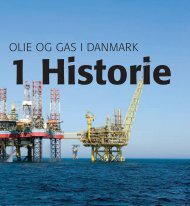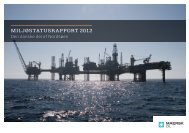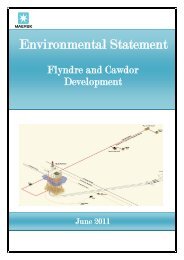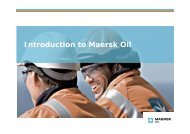Environmental Statement - Maersk Oil
Environmental Statement - Maersk Oil
Environmental Statement - Maersk Oil
You also want an ePaper? Increase the reach of your titles
YUMPU automatically turns print PDFs into web optimized ePapers that Google loves.
emergency planning<br />
(Installations)<br />
A ‐ 32<br />
Pollution Control) Regulations 2002 (as<br />
amended by the Energy Act<br />
(Consequential Modifications)<br />
(Offshore <strong>Environmental</strong> Protection)<br />
Order 2010)<br />
Offshore Chemical Regulations 2002<br />
(as amended 2011) (as amended by the<br />
Energy Act (Consequential<br />
Modifications) (Offshore<br />
<strong>Environmental</strong> Protection) Order 2010)<br />
Offshore Petroleum Activities (<strong>Oil</strong><br />
Pollution Prevention and Control)<br />
Regulations 2005 (as amended<br />
2011)(as amended by the Energy Act<br />
(Consequential Modifications)<br />
(Offshore <strong>Environmental</strong> Protection)<br />
Order 2010)<br />
Balloch Field Development <strong>Environmental</strong> <strong>Statement</strong><br />
Appendix A – Review of Legislation<br />
In the event of an incident or accident involving an offshore installation where there may be a risk of significant pollution<br />
of the marine environment or where the operator fails to implement effective control and preventative operation the<br />
Government is given powers to intervene.<br />
DECC under agreement with MCA will notify Secretary of State Representative (SOSREP) in the event of an incident if<br />
there is a threat of significant pollution into the environment. The SOSREP’s role is to monitor and if necessary intervene<br />
to protect the environment in the event of a threatened or actual pollution incident in connection with an offshore<br />
installation.<br />
The Energy Act 2008 (Consequential Modifications) (Offshore <strong>Environmental</strong> Protection) Order 2010 amends the<br />
Offshore Installations (Emergency Pollution Control) Regulations 2002 to ensure that the powers of the Secretary of State<br />
to prevent or reduce accidental pollution extend to accidents resulting from CCS.<br />
These Regulations require all use and discharge of chemicals at offshore oil and gas installations to be covered under a<br />
permit system. Exceedance of discharge limits must be reported.<br />
Amendments to the Offshore Chemicals Regulations 2002, made under Schedule 2 of the Offshore Petroleum Activities<br />
(<strong>Oil</strong> Pollution Prevention and Control) Regulations 2005 (OPPC), increase the powers of DECC inspectors to investigate<br />
non‐compliances and risk of significant pollution from chemical discharges, including the issue of prohibition or<br />
enforcement notices.<br />
Under these Regulations it is an offence to make any discharge of oil other than in accordance with the permit granted<br />
under these Regulations for oily discharges (e.g. produced water). However, it will be a defence to prove that the breach<br />
of permit arose from an event that could not be reasonably prevented.<br />
Permits now extend to pipelines under the 2011 amendments and to carbon sequestration activities under the Energy<br />
Act (Consequential Modifications) (Offshore <strong>Environmental</strong> Protection) Order 2010.<br />
OSPAR Recommendation 2010/18 OSPAR recommendation 2010/18 on the prevention of significant acute oil pollution from offshore drilling activities came<br />
into force on 24 th September 2010.<br />
According to OSPAR recommendation 2010/18, contracting parties should:<br />
Continue or, as a matter of urgency, start reviewing existing frameworks (i.e. the regulatory mechanisms and<br />
associated guidance applied by the Contracting Parties in the OSPAR area), including the permitting of drilling<br />
activities in extreme conditions. Extreme conditions include, but are not limited to, depth, pressure and<br />
weather<br />
Evaluate activities on a case by case basis and prior to permitting<br />
<strong>Oil</strong> pollution The Merchant Shipping EC Directive 2005/35 on ship‐source pollution and on the introduction of penalties for infringements states that ship‐




